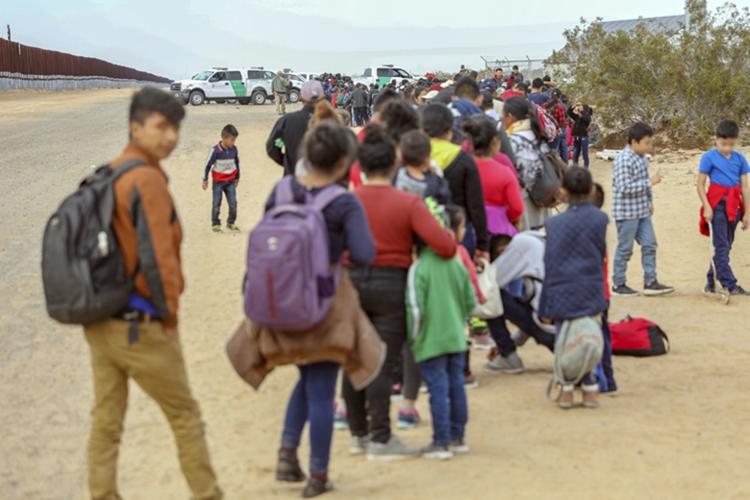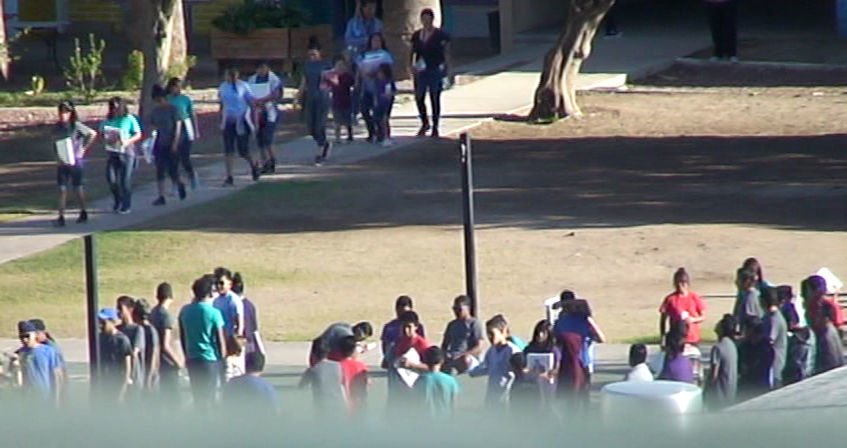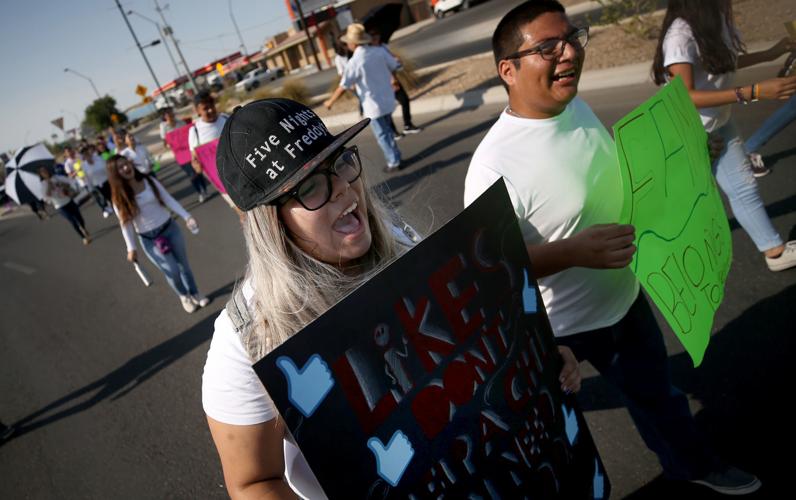As the Trump administration sends mixed messages about whether family separations will restart at the U.S.-Mexico border, five recent legal claims offer fresh insight into the trauma parents and children endured in Arizona last year.
Two weeks after leaving Guatemala in May 2018, a father and his 7-year-old son crossed the Arizona-Mexico border near San Luis and saw a light in the distance. Thinking it was a Border Patrol station, the father walked toward the light for hours while carrying his exhausted son in his arms.
They came to the United States after their house in the mountains of Guatemala was burned down in an attempt to kill the family. They are part of the indigenous Q’anjob’al tribe and the father is an environmental activist. They also needed to find a way for the boy to get regular checkups after undergoing heart surgery.
The father finally stopped walking around 2 a.m. and built a campfire, partly for heat and partly to attract any nearby Border Patrol agents.
When an agent arrived, he called them “stupid f***ing animals” in Spanish, the claim says, an early indication of the ordeal the father and son faced. They were separated soon after the agent took them into custody. By the time they were reunited 70 days later, the father was left trying to persuade his son it all had been a “bad dream.”
Now, they plan to sue the federal government for $3 million for deliberately harming them, according to a claim presented April 4 to federal agencies involved in the separation of more than 2,700 children from their parents.
The Trump administration stopped its widespread practice of separating families on June 20, although another 245 separations occurred since then, according to government data cited in a Feb. 20 federal court filing in Southern California.
In recent months, President Trump repeatedly told aides that he wanted to restart family separations, the New York Times reported April 8, citing three unnamed senior administration officials.
The next day, Trump told reporters at the White House, “We’re not looking to do that.” But he also praised the deterrent value of separating families, saying “once you don’t have it, that’s why you see many more people coming. They’re coming like it’s a picnic, because ‘let’s go to Disneyland.’”
Standing next to the border fence west of Nogales on Thursday, Vice President Mike Pence said the president is not planning to restart family separations.
At the same time, administration officials reportedly are discussing a “binary choice” policy, which was made possible by an August federal court order in Southern California.
Under that policy, border-crossing parents, some of whom are seeking asylum, could choose to waive one of two rights. A parent could choose to waive their child’s right to be released within 20 days and they would stay together in immigration custody. The parent also could waive his or her right to stay with their child. In that case, the child would be released to the Office of Refugee Resettlement.
“Binary choice is different. That’s up to the parent,” an unnamed senior administration official told Politico in a Wednesday report. “That means we wouldn’t be separating anybody. The parent makes that decision.”
While the Trump administration considers how to handle tens of thousands of asylum seekers from Central American countries, at least five Guatemalan parents who were separated from their children in Arizona have presented federal agencies with legal claims since February. If federal officials do not respond within six months, the parents could sue the government, possibly in federal court in Arizona.
The recent claims mark a new phase in the legal battles over family separations. Last year, parents sued to be reunited with their children, most notably through an ongoing class-action lawsuit in Southern California. Now, parents are asking to be compensated for the suffering they and their children endured.
Individual parents also filed lawsuits last year in Washington, D.C., asking to be reunited with their children. One lawsuit that is widely cited, including in the April 4 claims, stemmed from the separation of a Guatemalan woman and her two sons prior to appearing in Tucson’s federal court.
In her case, a judge ordered she be reunited with her children last July, saying “nothing in federal law suggests that deterring immigration by indefinitely separating families once the parents have been transferred to immigration custody is a compelling or legitimate government objective.”
Clutched tightly
The 7-year-old boy who crossed the border with his father near San Luis started screaming when an agent entered the cell in the detention center.
He watched as a man refused to let agents take away his son. The agent grabbed the man by his neck and shoved him back into the cell, “forcibly grabbing and taking his son,” according to the Feb. 4 claim presented by Covington and Burling, a Washington, D.C.-based law firm, and the Southern Poverty Law Center.
As other children were taken from the cell, the father of the 7-year-old boy, both of whom were identified by their initials in the claim, coached the boy not to struggle. If he did, he might aggravate the wounds from his heart surgery.
When it came time for agents to take the boy, he “clutched his father tightly.” The agents yelled at the father to let his son go and more agents approached, the claim says. The agents “ripped their hands apart” and the father saw “incredible fear on his son’s face that he will never forget.”
The boy called out “‘Daddy, why are you letting them take me?’”
In the following week, the father was moved among detention facilities, including one where the smell was so bad that “people fainted every so often and an agent would come and take them away,” according to the claim.
About two months after his son was taken, immigration officers told him he could be deported with his son or he could be deported alone. He said he wanted to be with his son.
After his brother and wife set up accounts so he could call them collect from a detention center in Georgia, he learned what had happened to his son since they were separated.
The boy was taken to New York, where he spent his days at a government-contracted institution and his nights at a foster home with several other children.
“On various occasions, at night, other children climbed into (the boy’s) bed and touched (the boy’s) penis, butt, and chest,” according to the claim. The boy told the adult at the foster home, but “the sexual abuse persisted.”
The boy was evaluated for trauma and registered 36 points. Clinical trauma is defined as 15 points or higher, according to the claim.
The boy reported the abuse to a counselor, who then reported it to New York City police. But the investigation stalled when the boy was taken to a detention center in Texas in late July.
Police said the contractor running the foster-care program “does not have any forwarding information to contact the child or his father,” according to the claim.
Health and Human Services, which oversees the care of children separated from their parents after border crossings, said in a statement its officials could not comment on pending litigation. The agency has policies in place to “maintain the privacy, security and well-being” of children in its custody.
A Customs and Border Protection spokesman said the agency does not comment on pending litigation.
Meanwhile, the boy’s father didn’t know why his son had been taken from him until early July, when the Spanish-language news channel Univision reported on a policy called “zero tolerance.” He and other detainees crowded around the television in a detention center and saw that a judge had ordered the government to reunite children with their parents.
A few weeks later, officers brought him and about 30 fathers into a room and took off their chains. The door opened and children walked in one by one. Eventually, he spotted his son, “who was looking around the room fearfully and crying.”
The boy did not recognize his father at first but eventually jumped into his arms. After holding each other for several minutes, the boy said “Daddy, we have to leave right now so they don’t take us again.”
Since his detention, the boy has gone from being “outgoing, friendly and trusting of adults” to now being “hyper-vigilant” and having “tantrums for no apparent reason.” He often has nightmares and “repeatedly tells a story of when he got lost on a train and another child found him and taught him ‘how to take deep breaths if you are scared.’”
Due to the boy’s fear of adults in uniform, his father rarely takes him anywhere except his cardiologist appointments and school, where he is in the second grade.
Like a funeral
A half-dozen crying children stood on one side of the room while their parents stood on the other side. Agents then led the children in a line out of the room as their parents “felt powerless to do anything.”
The father of one of the children described the walk back to the holding cell as “like a funeral,” with grown men and women “openly and uncontrollably weeping,” according to another Feb. 4 claim for $3 million filed by the same groups.
A father and his daughter, 5, fled gang violence and extortion in Guatemala. They were taken into custody along with a group of migrants and their children near San Luis on May 8, 2018.
After his daughter was taken, the father and several others were transported to federal court, and he was sentenced to time served. He was moved to a detention center in Florence and then to Georgia.
He learned his daughter was in New York, but he did not have any money to call her. He started working as a janitor at the detention center, earning about $2 a day.
He spoke with his daughter for the first time on May 31. They remained separated for another seven weeks.
After the girl was led out of the room in the detention center, she took the first plane ride of her life and landed in New York City on May 11.
While she was in foster care in New York, a boy residing at the same house “inappropriately touched her chest” and later grabbed her face and tried to kiss her, according to the claim.
She was moved to a new foster home, where the foster mother used offensive words in Spanish that made the girl uncomfortable. At times, she was locked in a room as punishment.
On July 21, she was reunited with her father in Texas. They resettled in Massachusetts while the father pursues an asylum claim.
The girl now “cries frequently for no apparent reason” and “inexplicably becomes angry.” She has nightmares about being separated from her father and detained.
In addition to the claims presented April 4, other immigrant advocates and law firms presented three claims on Feb. 11 that involved border crossings in Arizona.
Each of the claims asked for $3 million from the government. The claims were presented by the American Immigration Council, the National Immigration Justice Center, the Arnold and Porter law firm in Washington, D.C., and the Kairys, Rudovsky, Messing, Feinberg and Lin law firm in Philadelphia.
Nearly deported
The asylum officer said they were out of time and ended the interview before Leticia, 25, could explain that she and her 5-year-old daughter fled from gang members who assaulted Leticia twice and threatened to kill them both, according to one of the claims.
The mother and daughter were arrested at the Arizona-Mexico border on May 11. The next day, Leticia’s daughter was taken from her at a detention center. To calm her daughter, Leticia told her, “Honey, it’s going to be OK; you’re just going to play.”
The officers told Leticia they needed to hurry up because a plane was waiting for the children, which came as a shock to Leticia. Until that moment, she had assumed her daughter would be taken to a facility nearby.
Soon after, an officer returned to the cell where Leticia was held and said her daughter would not let anyone bathe her but her mother.
“Leticia went into the showers, washed her daughter, quietly gave her some juice, and said goodbye,” according to the claim. She did not see her daughter again for four months.
Leticia was taken to the Santa Cruz County jail for two weeks and then moved to a detention center in Nevada. Weeks later, her brother in Florida found her daughter at a foster-care center in New York and Leticia spoke with her on the phone.
Although she was not charged with a crime, Leticia was housed at a detention center with women facing criminal charges. She was “terrified and treated harshly,” according to the claim.
“At one meal, an inmate pushed her, causing her to drop her tray. A prison guard communicated that she would be tased if she dropped her tray again.”
After her immigration attorney visited her, “a jail guard strip-searched Leticia, ordering her to remove all her clothing — including her underwear — bend over, and cough. Leticia was humiliated,” the claim says.
In September, Leticia was reunited with her daughter at a detention center in Texas. She spoke with another asylum officer who determined that her fear of returning to Guatemala was credible. Leticia and her daughter were released from custody in November.
Vomiting regularly
Even after Elena, 35, was reunited with her 13-year-old son, the anxiety from their separation caused her to vomit regularly when her son left her side to attend classes at a detention center in Texas.
They fled a gang in Guatemala after she told police the gang had assaulted another woman in early 2018. The gang members threatened Elena and said they would kill her son if he didn’t join the gang.
They fled Guatemala and were arrested May 8 at the Arizona-Mexico border, according to a Feb. 11 claim. They were taken to a detention center and on the second day officers started removing children from the center.
“A few at a time, children were taken to a shower, and then dressed in identical blue uniforms and black shoes,” the claim says. “The children were instructed to line up to leave.”
Her son was taken to a foster-care center in New York and she was moved to a detention center in Eloy. They did not see each other for 77 days. Elena is pursuing an asylum claim while living in Massachusetts.
Never charged
The 24-year-old mother of a 7-year-old girl was never charged with a crime after they approached the San Luis port of entry on May 16, 2018. Even so, they were separated for more than two months.
They fled Guatemala to escape the mother’s partner, a member of the Guatemalan military who “regularly abused both of them” and refused to let her end the relationship, according to the claim.
The mother and daughter were separated the day after they were taken into custody. They were reunited in July and spent another four months in custody in Texas before they were released in November.
As their claims move through the legal system and the Trump administration debates how to deal with families crossing the border, large groups of families traveling together continue to turn themselves over to Border Patrol agents in Southern Arizona.
Since his detention, the boy has gone from being “outgoing, friendly
and trusting of adults” to now being “hyper-vigilant”
and having “tantrums for no apparent reason.” Legal claim involving a Guatemalan father and 7-year-old son separated at the border






